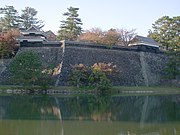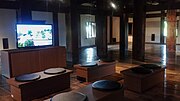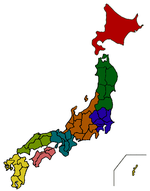Matsue Castle
| Matsue Castle | |
|---|---|
松江城 | |
| Matsue, Shimane Prefecture, Japan | |
 The keep of Matsue Castle in 2008 | |
| Coordinates | 35°28′30″N 133°03′02″E / 35.474977°N 133.050556°ECoordinates: 35°28′30″N 133°03′02″E / 35.474977°N 133.050556°E |
| Type | Japanese castle |
| Height | 30 metres |
| Site information | |
| Controlled by | (1611–1633) Kyōgoku clan (1633-1637) Matsudaira clan (1637-1927) City of Matsue (1927-present) |
| Site history | |
| Built | 1607-1611 |
| Built by | Horio Yoshiharu |
Matsue Castle (松江城, Matsue-jō) is a Japanese castle located in Matsue, Shimane Prefecture.
Matsue Castle was constructed from 1607 to 1611 by Horio Yoshiharu, the first daimyō of the Matsue Domain, during the early Edo period. Ownership was passed to the Izumo branch of the Kyōgoku in 1633 and then the Matsudaira, a junior branch of the ruling Tokugawa clan, in 1637. The Matsudaira donated Matsue Castle to the city of Matsue in 1927.
Matsue Castle is one of few remaining feudal Japanese castles in their original wooden form and not a modern concrete reconstruction. Built after the last great war of feudal Japan, the castle has survived earthquakes, fires, wars and other causes that destroyed or damaged other Japanese castles. Several castle buildings were demolished during the early Meiji period with only some of the original keep and stone walls existing today. Matsue Castle, standing on the shores of Lake Shinji, is one of Japan's Three Great Lake Castles and the heart of Matsue's central riverside district.[1]
History[]
Of the 100+ castles remaining in Japan, Matsue Castle is the only one remaining in the San'in region. This castle is the second largest, the third tallest (30m) and the sixth oldest amongst castles. It was built over a period of 5 years by the daimyō of the Izumo region, Horio Yoshiharu, and was completed in 1611.
After the reigns of Horio Tadaharu and Kyōgoku Tadataka, , a grandson of Tokugawa Ieyasu, became Lord of the castle, after being transferred from Matsumoto in Shinano Province, and thus began a reign that lasted 10 generations of the Matsudaira clan over a period of 234 years.
In 1875, all of the buildings within the castle were dismantled, with the exception of the castle tower itself, which was allowed to remain due to pressure from interest groups. The castle underwent a complete reconstruction between 1950 and 1955.
The castle is a complex structure, built in a watchtower-style, that appears to be five stories from the outside, but has, in fact, six levels inside. Most of the walls of the castle are painted black. It is a strong structure, built to withstand warfare, yet at the same time, it is majestic and solemn, reminiscent of the Momoyama style.
Matsue Castle has been registered as a national treasure of Japan since July 9, 2015.[2]
Gallery[]

Ninomaru
Ruins of the Ote gate

Castle interior
References[]
- ^ "About Matsue Castle - Shimane Travel Guide | Planetyze". Planetyze. Retrieved 2018-02-13.
- ^ http://tabijikan.com/article/17201/ | Matsue Castle - finally designed as a Japan's national treasure in 2015 | Retrieved 17 Jan 2017.
Literature[]
- Benesch, Oleg and Ran Zwigenberg (2019). Japan's Castles: Citadels of Modernity in War and Peace. Cambridge: Cambridge University Press. p. 374. ISBN 9781108481946.
- Schmorleitz, Morton S. (1974). Castles in Japan. Tokyo: Charles E. Tuttle Co. ISBN 0-8048-1102-4.
- Motoo, Hinago (1986). Japanese Castles. Tokyo: Kodansha. p. 200 pages. ISBN 0-87011-766-1.
- Mitchelhill, Jennifer (2013). Castles of the Samurai:Power & Beauty. USA: Kodansha. ISBN 978-1568365121.
External links[]
| Wikimedia Commons has media related to Matsue Castle. |
- Castles in Shimane Prefecture
- Museums in Shimane Prefecture
- History museums in Japan
- Historic Sites of Japan
- National Treasures of Japan
- Kyōgoku clan
- Matsue-Matsudaira clan






